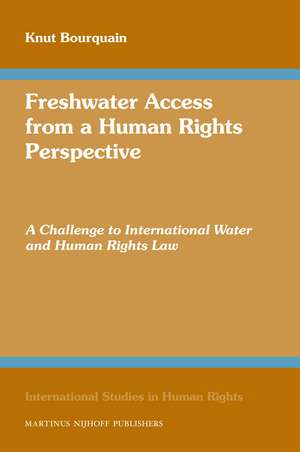Freshwater Access from a Human Rights Perspective: A Challenge to International Water and Human Rights Law: International Studies in Human Rights, cartea 97
Autor Knut Bourquainen Limba Engleză Hardback – 16 sep 2008
Din seria International Studies in Human Rights
-
 Preț: 384.86 lei
Preț: 384.86 lei - 5%
 Preț: 735.66 lei
Preț: 735.66 lei - 5%
 Preț: 649.68 lei
Preț: 649.68 lei - 27%
 Preț: 1374.24 lei
Preț: 1374.24 lei - 15%
 Preț: 586.70 lei
Preț: 586.70 lei - 18%
 Preț: 554.46 lei
Preț: 554.46 lei - 18%
 Preț: 723.72 lei
Preț: 723.72 lei - 18%
 Preț: 692.09 lei
Preț: 692.09 lei - 18%
 Preț: 616.40 lei
Preț: 616.40 lei - 18%
 Preț: 1036.47 lei
Preț: 1036.47 lei - 18%
 Preț: 697.26 lei
Preț: 697.26 lei - 18%
 Preț: 672.06 lei
Preț: 672.06 lei - 18%
 Preț: 1269.59 lei
Preț: 1269.59 lei - 18%
 Preț: 1065.23 lei
Preț: 1065.23 lei - 18%
 Preț: 776.54 lei
Preț: 776.54 lei - 18%
 Preț: 876.58 lei
Preț: 876.58 lei - 18%
 Preț: 917.97 lei
Preț: 917.97 lei - 18%
 Preț: 826.37 lei
Preț: 826.37 lei - 18%
 Preț: 827.96 lei
Preț: 827.96 lei - 18%
 Preț: 825.20 lei
Preț: 825.20 lei - 18%
 Preț: 770.98 lei
Preț: 770.98 lei - 18%
 Preț: 1305.68 lei
Preț: 1305.68 lei - 18%
 Preț: 851.48 lei
Preț: 851.48 lei - 18%
 Preț: 700.82 lei
Preț: 700.82 lei - 18%
 Preț: 635.01 lei
Preț: 635.01 lei - 18%
 Preț: 631.86 lei
Preț: 631.86 lei - 18%
 Preț: 692.18 lei
Preț: 692.18 lei - 18%
 Preț: 656.32 lei
Preț: 656.32 lei - 18%
 Preț: 725.17 lei
Preț: 725.17 lei - 18%
 Preț: 727.09 lei
Preț: 727.09 lei - 18%
 Preț: 703.54 lei
Preț: 703.54 lei - 18%
 Preț: 674.70 lei
Preț: 674.70 lei - 18%
 Preț: 907.05 lei
Preț: 907.05 lei - 18%
 Preț: 713.27 lei
Preț: 713.27 lei - 18%
 Preț: 1143.94 lei
Preț: 1143.94 lei - 18%
 Preț: 699.42 lei
Preț: 699.42 lei - 18%
 Preț: 649.98 lei
Preț: 649.98 lei - 18%
 Preț: 798.29 lei
Preț: 798.29 lei - 18%
 Preț: 863.31 lei
Preț: 863.31 lei - 18%
 Preț: 669.41 lei
Preț: 669.41 lei - 18%
 Preț: 1431.10 lei
Preț: 1431.10 lei - 18%
 Preț: 1394.61 lei
Preț: 1394.61 lei - 18%
 Preț: 631.25 lei
Preț: 631.25 lei - 18%
 Preț: 1084.81 lei
Preț: 1084.81 lei - 18%
 Preț: 1497.55 lei
Preț: 1497.55 lei - 18%
 Preț: 1085.67 lei
Preț: 1085.67 lei - 18%
 Preț: 1492.04 lei
Preț: 1492.04 lei - 18%
 Preț: 1090.11 lei
Preț: 1090.11 lei - 18%
 Preț: 1088.31 lei
Preț: 1088.31 lei - 18%
 Preț: 1503.80 lei
Preț: 1503.80 lei
Preț: 652.18 lei
Preț vechi: 795.33 lei
-18% Nou
Puncte Express: 978
Preț estimativ în valută:
124.81€ • 135.52$ • 104.84£
124.81€ • 135.52$ • 104.84£
Carte indisponibilă temporar
Doresc să fiu notificat când acest titlu va fi disponibil:
Se trimite...
Preluare comenzi: 021 569.72.76
Specificații
ISBN-13: 9789004169548
ISBN-10: 9004169547
Pagini: 258
Dimensiuni: 160 x 240 x 20 mm
Greutate: 0.59 kg
Editura: Brill
Colecția Brill | Nijhoff
Seria International Studies in Human Rights
ISBN-10: 9004169547
Pagini: 258
Dimensiuni: 160 x 240 x 20 mm
Greutate: 0.59 kg
Editura: Brill
Colecția Brill | Nijhoff
Seria International Studies in Human Rights
Notă biografică
Knut Bourquain, Ph.D. (2008) in Law, was research associate at the Center for International Development and Environmental Research at the University of Gießen. He is currently working as an attorney at law in Germany.
Cuprins
Acknowledgement; A. Introduction; I. The background situation – water scarcity as a global problem; II. Causes of the current crisis; III. Strategies of crisis management; IV. The role of law in problem-solving; V. The human rights-based approach to freshwater access in international law; VI. Synopsis of the study; B. The law on international watercourses and its deficits in providing freshwater access;I. Introduction; II. Survey of the development of international water law in the 20th century; III. Analysis of international water law in regard to fulfilling the basic human need for water; IV. Concluding observations on international water law’s deficits; C. Elements of a human rights-based approach to freshwater access; I. Introduction; II. Characteristics of a human rights-based approach to freshwater access; III. Human rights-based approaches vs. policy concepts?; IV. Freshwater access in the context of the debate on rights to development and a clean environment; V. Elaboration of the scope of obligations attached to a human rights-based approach to freshwater access; VI. Universalism, particularism and pluralistic legal systems; VII. Concluding observations on the characteristics of a human rights-based approach to freshwater access; D. The human rights-based approach to freshwater access within current international human rights law; I.Introduction; II. Freshwater access within international human rights treaties; III. Freshwater access as part of customary international human rights law; IV. Freshwater access as part of general principles of international law; V.Extraterritorial obligations of states concerning the basic human need for water; VI.Concluding observations on the international human rights law’s contribution to freshwater access;E. Improving a human rights-based approach to freshwater access;I. Introduction; II. The need to connect human rights law with international water law; III. Establishing new international treaty law; IV. Specifying and developing the human rights-based approach to freshwater access by the interpretation of existing law; V. Soft law and policy instruments strengthening a human rights-based approach to freshwater access;VI. Concluding observations on prospects for the improvement of a human rights-based approach to freshwater access; F. Conclusions; Bibliography; Index.
